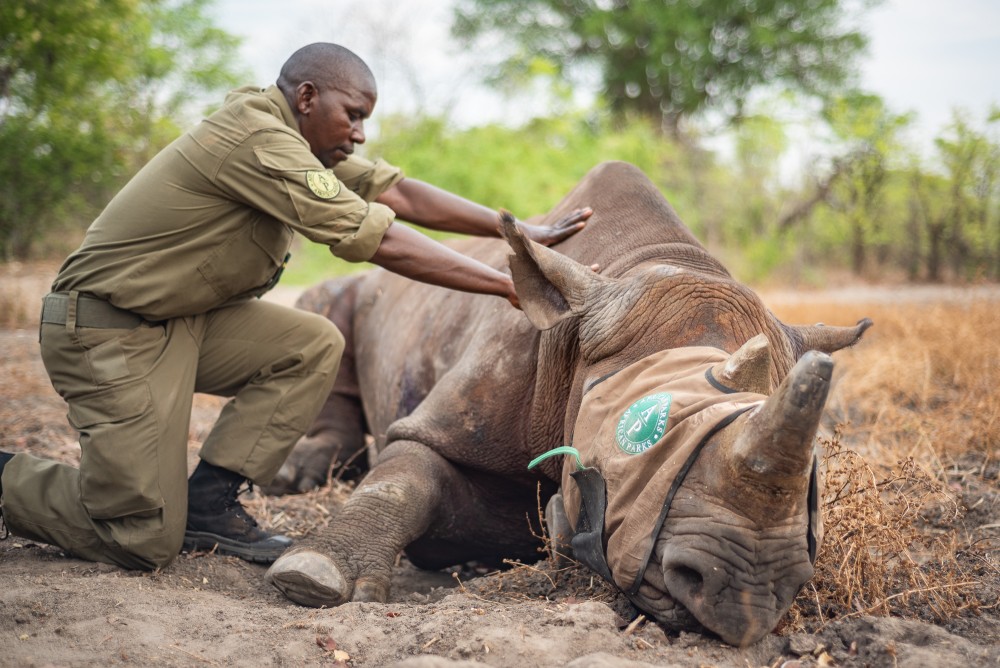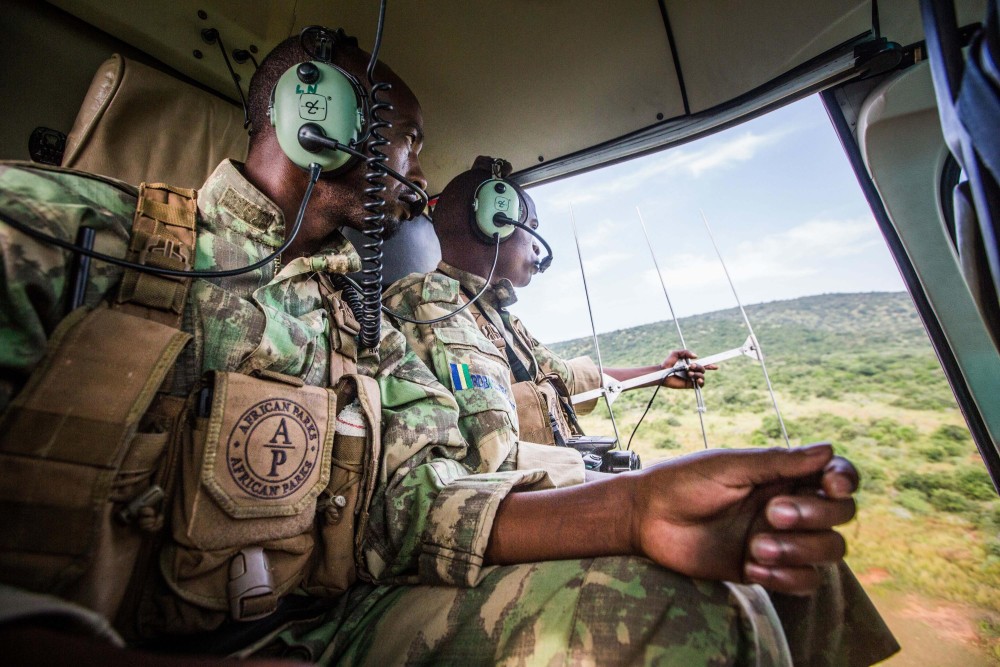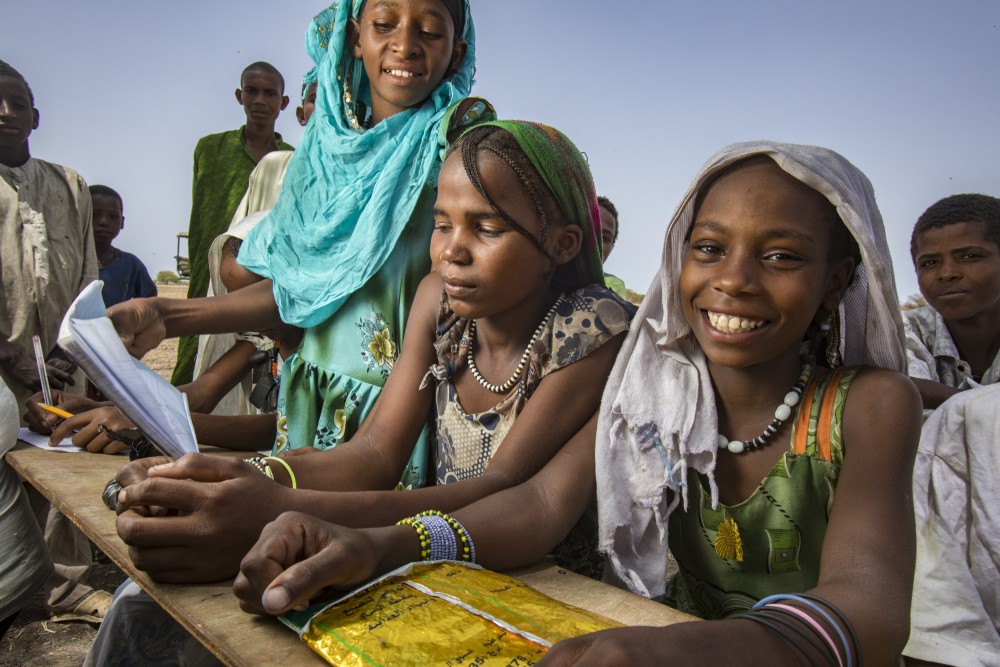CEO’s Letter & Executive Summary
Peter Fearnhead
Twenty years ago, Dr Anthony Hall-Martin, Michael Eustace, Paul Fentener van Vlissingen, Mavuso Msimang and I set out to create a new paradigm for protected area management. We wanted to address the challenge of why many parks in Africa, despite their legal designations, were failing. Our solution was to create an organisation that could be held accountable for results; one where skilled park management had full responsibility for park management actions; where the parks were adequately funded based on their needs, and with legal frameworks that ensured clear governance. Since our beginnings we have stayed true to our mission, knowing these things matter most in the effective protection of national parks for the benefit of people and wildlife.
From Majete in 2003 to now 17 parks in 11 countries with over 13.3 million hectares under management, we have accelerated and scaled our work knowing that we are in a race against time. What is not well-managed will be lost. Our model is proving that effectively managed parks deliver a host of ecological, socio-political and economic benefits for people living in and around these landscapes. African Parks is one of the largest employers in every place we work, and tens of thousands of children have access to some form of education because of us. The parks serve as a nucleus of security, whereby the spill-over effect is large-scale stability. People who visit the parks come back saying it is not just awe for the natural landscapes they experienced, but also hope. Our approach has been resilient to the changing nature of the threats this continent has faced, for wildlife and people, over the years.
Take climate change as an example. When we began, it was not something global society was talking about. But in the last few years our Rangers and entire park teams have served as front-line responders in climate-related crises, flying in supplies and medical teams in the aftermath of deadly cyclones, or providing food relief to vulnerable people who face total crop failure from drought. These are important and immediate responses, but they are reactionary. What is critical is our proactive role – securing those large landscapes, the parks, which are the cornerstone of any climate stabilisation approach. Through proper management these parks are playing a significant role in storing carbon and serving to capture and mitigate global emissions, protecting the catchments of three of Africa’s four greatest rivers, of containing the uncontrolled fires that burn Africa every year, and of restoring and maintaining the biodiversity that holds these systems together.
As I write this, a global pandemic is sweeping the planet bringing it to a virtual standstill, with profound social and economic impacts for us all, especially for rural communities. COVID-19, like MERS, SARS and Nipah, comes from nature, but it is our own doing that has unleashed it. The rise in habitat loss and exploitation of wildlife is undeniably linked to epidemics. If there was ever a case for protecting nature, if we ever needed a reminder that our mission matters and that nature matters to people’s lives, it is now.
The true test of a great model is not just in tackling the threats that are known, it is in its resilience in dealing with things we could never have imagined. While what we are currently experiencing is unprecedented, I am confident that the African Parks model, our team, and our community of supporters and partners in Government and civil society, will withstand this extraordinary test. The following pages are filled with stories of hope, transformation and defying the odds, to serve as a reminder. They are about brave ideas and actions, made possible over the years by you, our bold and committed partners and funders. As challenging as things will get, together we are walking the right path in protecting nature and reclaiming a sustainable future for everyone.
Sincerely,
Peter Fearnhead

OUR GROWTH - 2019 saw the addition of two new parks to our portfolio: Matusadona National Park, signed on November 1st with Zimbabwe Parks and Wildlife Management Authority (PWMA); and Iona National Park in Angola, signed on December 20th with the National Institute of Biodiversity and Conservation Areas (INBAC). This brought our footprint to 17 parks in 11 countries, spanning over 13.3 million hectares and covering nine of the 13 biomes in mainland Africa. We received official notification in November from the Rwanda Development Board (RDB) that our proposal for Nyungwe National Park was approved, and contract negotiations commenced. We began our work on the ‘Priority Intervention Plan’ for W National Park in Benin in September, which we anticipate evolving into a full management mandate in 2020. We are still awaiting a commitment from the Ministry of Tourism for Kafue National Park in Zambia. We were however pleased to be awarded, together with the World Wide Fund for Nature and Peace Parks Foundation, €16.9M by the Dutch Postcode Lottery on March 4th 2020. This was for collaborative work in the world’s largest terrestrial transfrontier conservation area (TFCA), the Kavango Zambezi (KAZA), which includes Kafue.
NATURE’S RETURN - 2019 was a good year for species restoration. In June, five Eastern black rhinos were transported to Akagera National Park in Rwanda from the Czech Republic, completing the largest black rhino move from European zoos. This was undertaken with the European Association of Zoos and Aquaria (EAZA) and RDB to increase the genetic diversity of Akagera’s existing rhino population. In July, cheetahs made a historic return to Majete Wildlife Reserve in Malawi. Donated by several Game Reserves in South Africa, their move was part of the larger cheetah metapopulation restoration plan for southern Africa. In July, 195 buffalo were translocated to Bangweulu Wetlands in Zambia in cooperation with Zambia’s Department of National Parks and Wildlife (DNPW) and Frankfurt Zoological Society.
In November, together with Ezemvelo KZN Wildlife, WWF - South Africa and Malawi’s Department of National Parks and Wildlife (DNPW), we successfully moved 17 black rhinos from South Africa to Liwonde National Park in Malawi. This was the largest single translocation by air. Based on a custodianship agreement between the Governments of Malawi and South Africa, we aim to boost Malawi’s black rhino populations and aid regional efforts to conserve the species. Unfortunately, three of the animals have since died, all through natural causes, but nevertheless Liwonde now has a strong and viable population.
In other highlights for wildlife, the Kordofan giraffe population in Garamba National Park in the Democratic Republic of Congo (DRC) increased to 55 individuals, up from 48 in 2018. The International Crane Foundation counted 13,885 northern black crowned cranes in Zakouma National Park in Chad, the highest number of cranes ever recorded in one place. Wildlife surveys in Ennedi Natural and Cultural Reserve in Chad revealed a minimum of 185 bird species and 20 mammal species. Another five elephants and eight Kordofan giraffe were collared in Zakouma; 25 elephants were collared in Pendjari National Park in Benin and 20 elephants were collared in Odzala-Kokoua National Park in Congo. All these collarings help us to understand wildlife movements better, and therefore to monitor them. Initial camera trapping data show that wildlife numbers are on the rise in a remarkable way in Chinko in the Central African Republic, which we look forward to reporting on in 2020. Chinko has all the potential to become one of the greatest conservation success stories on the continent.

BUILDING STABILITY - We have been making the case for years that effectively run protected areas deliver benefits, including life-saving ones, for countless people living in and around these parks. This was very much the case in March when Cyclone Idai came hurtling through Mozambique and Malawi, causing devastating impacts. Many lost their homes and their livelihoods, and had no access to drinking water, food or healthcare. In response, we launched an emergency operation from Bazaruto Archipelago National Park in Mozambique to provide critical aid to communities. In two days we raised US$200,000 for relief efforts and immediately deployed a helicopter, two boats and thirteen rangers, five of whom had advanced medical training, to bring aid and assistance to isolated settlements. In one month our collective efforts delivered over 140 tonnes of food by boat and helicopter, transported 37 doctors and over 3,700 kgs of medical supplies and other essential items to more than 2,900 families who needed our help the most.
This was not the only natural disaster we responded to this year. Liuwa Plain National Park in Zambia experienced the worst drought on record, leaving much of the local community in a dire situation. Exceptionally low rainfall resulted in ruinously low crop yields and a deficit in ground water. From June to December we provided maize meal to 3,600 people to prevent starvation, and in so doing also reduce poaching pressure. Besides providing food, we worked with communities to phase out nonclimate resilient crops and move towards more reliable food sources that will fare better during droughts.
Despite Liuwa’s challenging times, we celebrated the official opening of King Lewanika Lodge in June. In an event presided over by His Majesty the Litunga Lubosi Imwiko II, we commemorated over a century of conservation where traditional custodianship under the Barotse Royal Establishment (BRE) has maintained a remarkable coexistence between people and wildlife. The lodge, which is managed by Time+Tide, is a significant step in the economic revival of the park, providing jobs and needed revenue even during difficult times.
Akagera’s fledgling fishing cooperative (COPABARWI) surpassed expectation by generating US$213,200 from selling over 112,000 kg of fish, 14,760 kg of which was sold to local communities at low cost. We also saw the official opening of Magashi by Wilderness Safaris, the first luxury camp for Akagera; and the park generated a record-breaking US$2.5M from tourism, making it 90% selffinancing with 50% of its visitors being Rwandan nationals. In May we announced a new partnership with Americares, a non-profit provider of donated medicine and medical supplies, to improve access to healthcare centres serving nearly 100,000 people living around Liwonde and Majete.

Our Ranger force continues to be the largest on the continent for any NGO. Garamba hosted DRC’s annual Ranger Day in April. The Deputy Governor of the Haut-Uele Province, Institut Congolais pour la Conservation de la Nature (ICCN) representatives, three local Chiefs, two Territorial Administrators and other local authorities, along with hundreds of local community members were in attendance. Odzala in Congo celebrated its first Ranger Day with 100 of our eco-guards. It was attended by numerous officials and community representatives including the Director of Agence Congolaise de la Faune et des Aires Protégées (ACFAP), the Préfet of Cuvette Ouest, and Sous-Préfet.
In September, we were pleased to host our President, Prince Harry, The Duke of Sussex, in Liwonde along with senior representatives from our key partners including Malawi’s Minister of Natural Resources, the Director of the DNPW, and the British High Commissioner. The Duke’s visit cast a spotlight on Malawi emerging as a conservation leader on the continent, progress achieved with our partnership with the DNPW and our joint anti-poaching collaboration with the British Military.
Sadly, we experienced a significant security challenge in Pendjari in Benin in May, with the murder of local Beninese guide Fiacre Gbédji and the kidnapping of two French national tourists by rebel groups supporting jihadi extremists. The tourists were rescued by French forces in Burkina Faso on May 9th. While we closed the crime-scene investigation area, Pendjari remained open until the wet season in July, and reopened in October amid an enhanced security plan for the park.
OUR TEAM - 2019 saw the development of our Executive Team in Head Office, with the addition of Kenneth Wanyoto as Director of Human Resources, Charles Wells as our Chief Operating Officer and Jean Labuschagne as our Director of Conservation Development and Assurance. We had two staff graduate from the South African Wildlife College (SAWC): Armstrong Chinga, our Senior Wildlife Police Officer in Liuwa, and Kambani Masamba, a Ranger Medic in Nkhotakota. Both received an Advanced Certificate in Nature Conservation in Transfrontier Conservation Management. For the second year in a row, we had African Parks Rangers recognised at the African Ranger Awards ceremony in Ghana hosted by the Paradise Foundation and the Alibaba Foundation. The seven Rangers were Daoba Dieudonne Komerewa, Garamba; Benito Willie, Majete; Forment Kalaba Chisala, Bangweulu; Dari Narakoua and Juste Sokoutinde, Pendjari; and Leonidas Mpumje and Anthony Nzuki, Akagera.
WITH GRATITUDE - So much has been accomplished this year, even through natural disasters, regional insecurity and other setbacks. But when I look back at 2019, I do so with a sense of pride and gratitude to the 2,620 full-time staff members, 96% of whom are local, to our Government partners who trust in us to manage their parks, and to our supporters who unwaveringly share in our vision. Together, we are realising hope – for both people and wildlife across Africa. On behalf of everyone at African Parks, thank you for standing with us in 2019, and for being with us in 2020 and beyond, in doing all we can to secure the last remaining natural ecosystems on which the people and wildlife of Africa depend.